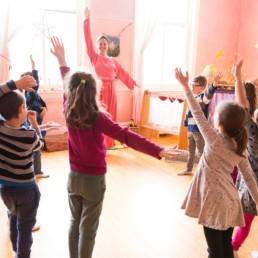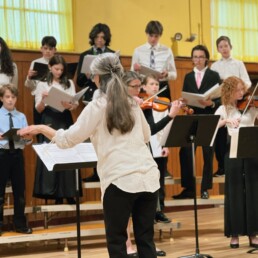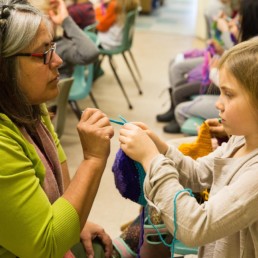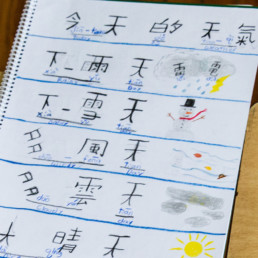Special Subjects
At the Susquehanna Waldorf School, touching is learning. After material is presented, direct tactile experiences are employed to engage students and help them understand each lesson. This unique approach allows us to cultivate curiosity and critical thinking skills each and every day. Drawing, painting, poetry, recitation, drama, singing, and playing a musical instrument all build academic skills that deepen comprehension. Each year the curriculum offers content appropriate to our students’ development.

Eurythmy
Eurythmy translates the sounds, phrases and rhythms of speech, or the dynamic elements of music into movement and gesture. The result has been described as visible speech and visible music. In the art of eurythmy, that which you would normally hear, you see in the movements of the eurythmist. Through eurythmy the children learn to listen carefully and to express, through appropriate movement, what they hear.
Music
Music is integral in the Waldorf curriculum. Singing is practiced with the class and music teacher throughout grades 1 to 8. In first grade the children begin to play the CHOROI pentatonic flute and chime bars then in second grade are introduced to the pentatonic lyre. In third grade they move to the diatonic flute or recorder which they will continue to play until eighth grade. By December of third grade, all students start weekly private music lessons with a string instrument of their choice. Parents are responsible for arranging these lessons; this cost is not included in tuition. All children will participate twice a week in orchestra class, as well as chorus and will perform several times during the year.


Fine Arts & Hand Work
The arts permeate the Waldorf curriculum and encourage curiosity, creativity, and critical thinking skills. Children paint with watercolor and create geometric forms. Dexterity is developed as the children learn to knit, crochet, and sew, work with beeswax, clay, and wood (beginning in fifth grade).
Language Studies
The spoken word is the key to learning languages in the early grades. In our world language curriculum, children are taught with songs, poems, rhymes, tongue-twisters, counting, and group games to foster group knowledge and appreciation of these languages. In the middle grades keeping a written record of the oral written work brings an awareness of spelling and basic grammar in the languages. In the upper grades, the geography of countries is taught along with history, literature, tradition and music to further develop an understanding of these cultures.
At SWS, Mandarin Chinese is taught to all students, grades 1-8. Spanish is taught to Grades 1-4, and students in Grades 5-8 receive Latin.

